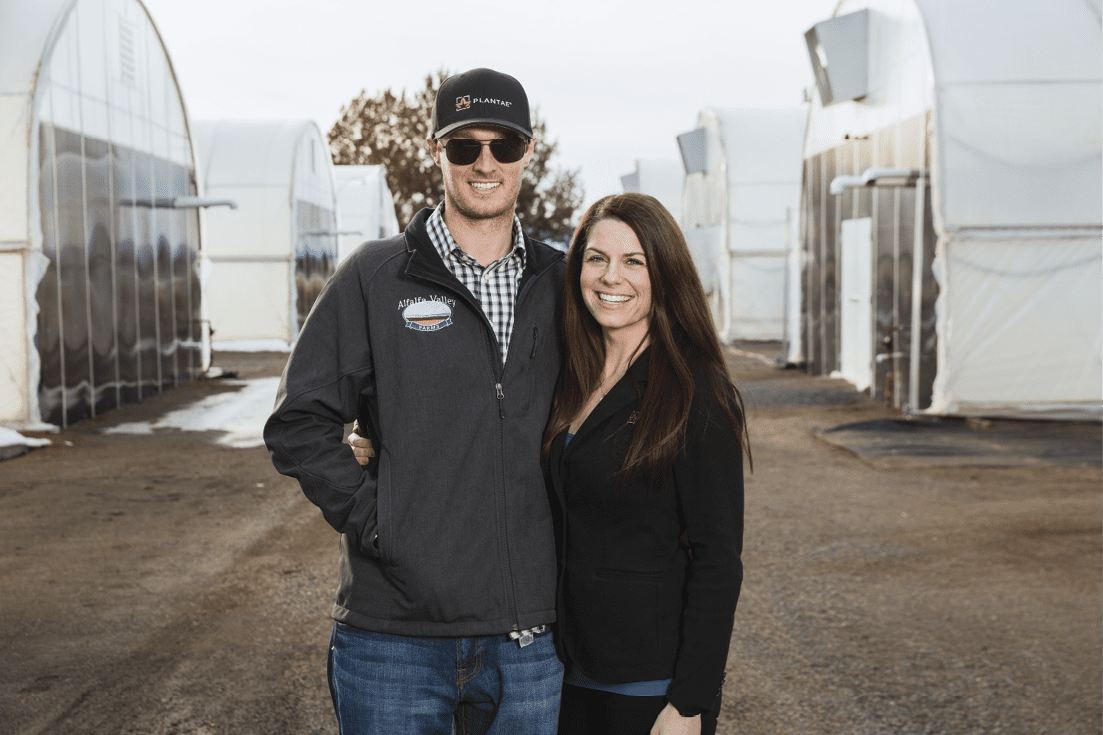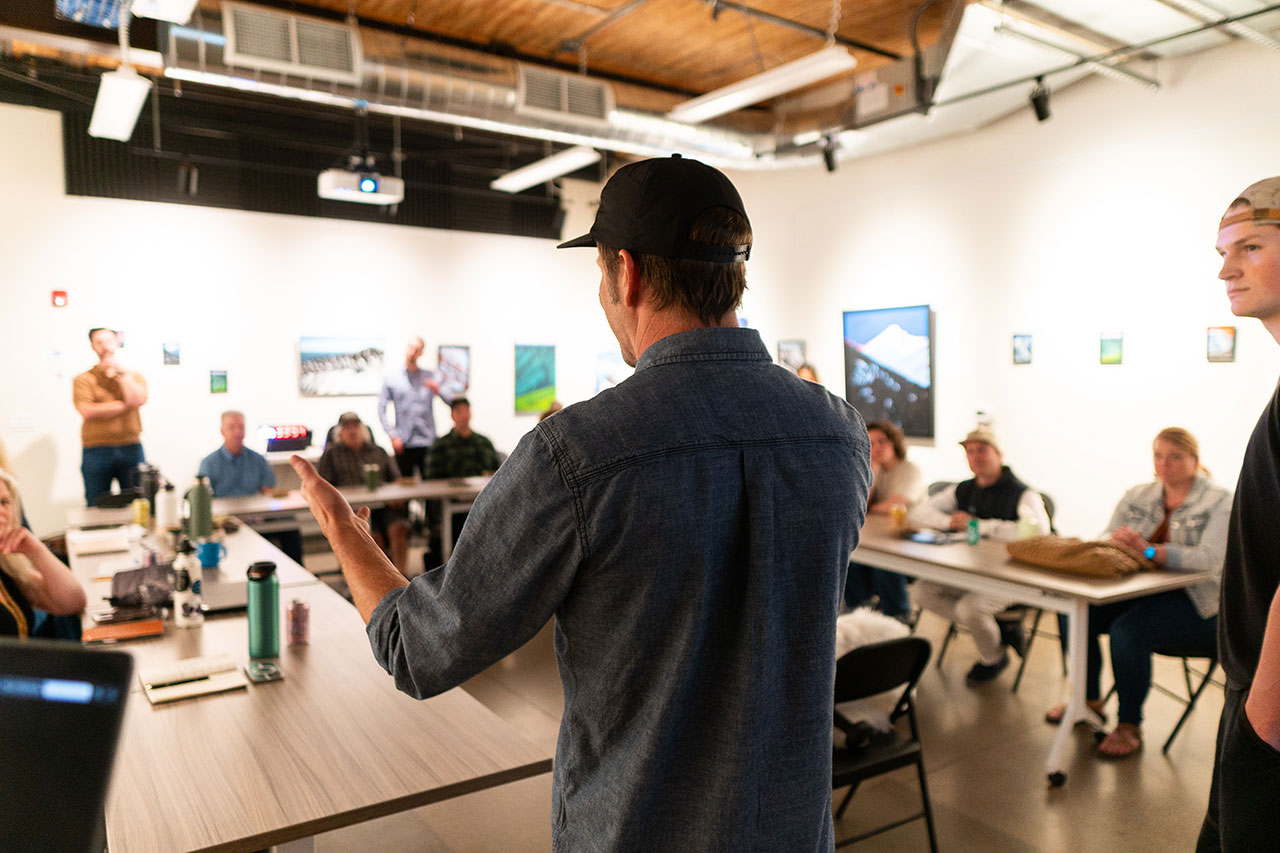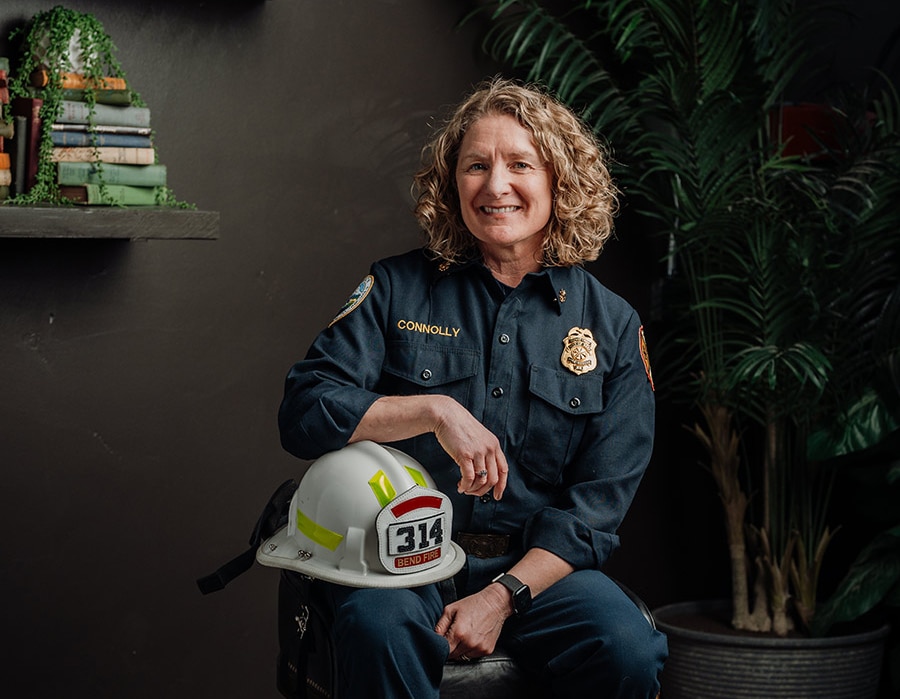Marijuana has gone mainstream in Central Oregon, and savvy entrepreneurs are cashing in on a fast-growing industry.
WRITTEN BY DAVE SEMINARA
PHOTOS BY RYAN CLEARY AND ADAM MCKIBBEN
In the November 2016 election, the biggest winner wasn’t Donald Trump or even the Republican Party—it was good old Mary Jane. And she won big. Voters in California, Massachusetts, Maine and Nevada approved recreational marijuana initiatives. Measures to legalize medicinal marijuana passed in Florida, North Dakota and Arkansas. Voters in Montana voted to roll back restrictions on medical marijuana use. A proposal to legalize possession and consumption of marijuana in Arizona, which failed by two percent, was the lone defeat for a product that’s clearly been on a roll for the better part of the last decade. Newly pot friendly states joined a party started by Colorado, Washington state and Oregon voters who had already shredded marijuana laws and turned America’s clandestine cash crop into a main street cash cow.
Beau Whitney, a Portland-based economist, has estimated that the legal and illicit cannabis industry in Oregon will have a total market sales of $750 million in 2017, with an overall economic impact of $3 billion. Recreational marijuana sales, which have been legal in the state since July 1, 2015, come with a 17 percent sales tax, and voters in the City of Bend approved an additional 3 percent tax on sales within the city limits. (There is no sales tax imposed on medical marijuana.) The Oregon Department of Revenue said that the marijuana tax generated $54.5 million in revenue from January 1, 2016 through November 30, close to $5 million per month.
The money continues to roll in. Early indicators show that 2017 should be another strong year for marijuana sales in the state. We talked to a host of local marijuana entrepreneurs about the past, present and future of an industry that has taken Oregon by storm.
The Boutique approach
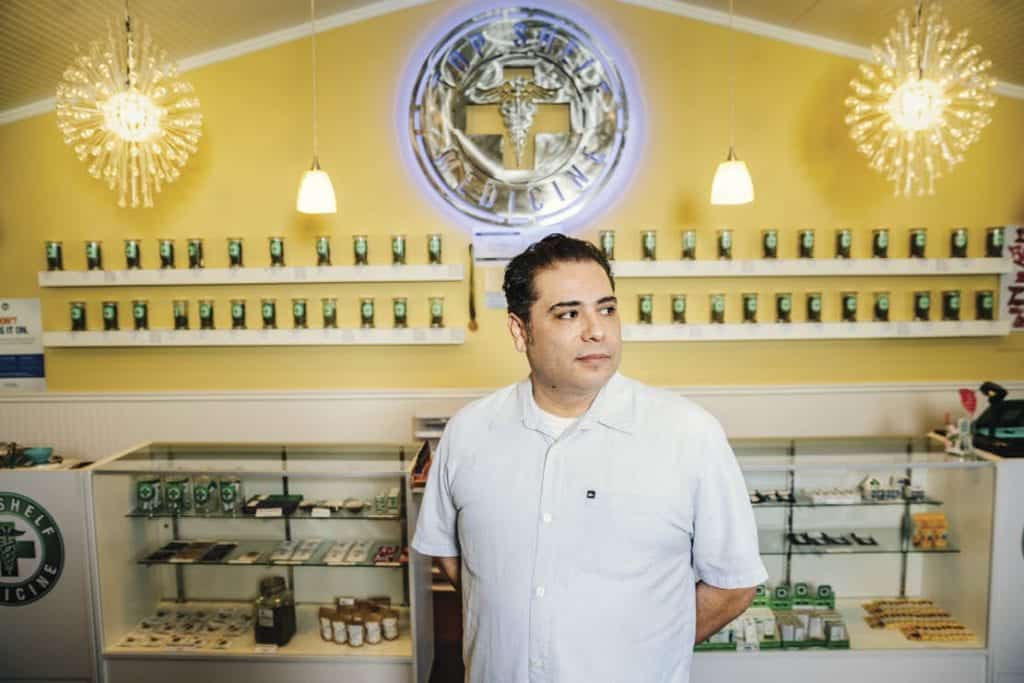
Oregonians no longer need to speak in code or meet dealers in dark alleys to buy cannabis. But while the industry is booming in Central Oregon, it still exists in a kind of limbo—embraced by many, but still shunned by banks and in some corners of polite society.
David Ordonez said that he and his wife, Serena, had to max out credit cards to start their cannabis retail business because no bank would give them a loan.
“We get doctors, lawyers, some of the most important professional people in the city are our customers,” said Ordonez. “But some of them still park around the corner because they don’t want to be seen coming in or out of our shop.”
I visited Top Shelf Medicine, Ordonez’s recreational and medical dispensary, on a mild, clear Tuesday morning in December, six days after a snowstorm coated the city streets with a foot of snow. If some of Top Shelf’s customers feel the need for discretion, it isn’t based on the store’s exterior, which betrays no hint of what they sell, just an illuminated sign featuring three prominent red crosses and a caduceus—a symbol from Greek mythology that is used to represent the medical profession.
Inside the waiting room were white leather couches that wouldn’t look out of place in a posh Danish furniture store, warm mood lighting and an artificial Christmas tree with wrapped presents that presented a balmy contrast to the wintry scene outside. Save for the state-mandated bilingual warning signs on the door, the vibe is more high-end Beverly Hills plastic surgery clinic than Central Oregon weed purveyor, and this is exactly as Ordonez prefers.
“Every Tom, Dick, and Harry is growing pot nowadays, but we’re trying to be the Nordstrom of the industry,” he said as I complied with state law by signing in and placing a visitor’s badge around my neck.
Ordonez led me into their cannabis showroom, which has security cameras, motion detectors, bars on the windows and Christmas stockings next to the cash register. All the weed, the edibles, the pipes, and accessories save for the shop’s own swag and a fridge full of cannabis edibles are kept behind well-polished glass counters.
Jars of cannabis—including strains such as Gorilla Glue, Girl Scout Cookies and his own creation, Jenke Kush, which Ordonez said won a High Timesmagazine award—are on display behind the counter, along with their THC (tetrahydrocannabinol) and CBD (cannabidiol) scores. (THC essentially signifies potency, while those in search of pain relief look for a high CBD score.)
Regular customers Natasha Newby and her fiancé, Ray Atkinson Jr., both of Bend, said they typically looked for high CBD score strains, which helps her cope with fibromyalgia, and gives him relief from the rheumatoid arthritis that is at times debilitating.
Atkinson, who is in the process of trying to qualify for disability, said that before cannabis was legal, he had to buy from dealers he met on the street.
Ordonez said that a big chunk of his customers are people like them: technically recreational users but ones who could qualify for medical cards if the cost and red tape were less prohibitive. For him, bringing customers like Atkinson and Newby out of the shadows and into a safe, regulated retail environment is a reward that makes all the hassles and frustrations of running a marijuana business worthwhile.
Now that all Oregonians have a right to access to marijuana for recreational and medical purposes, Ordonez said, “I want to be the guy who sells them the very best stuff.”
The Next Generation Farmers
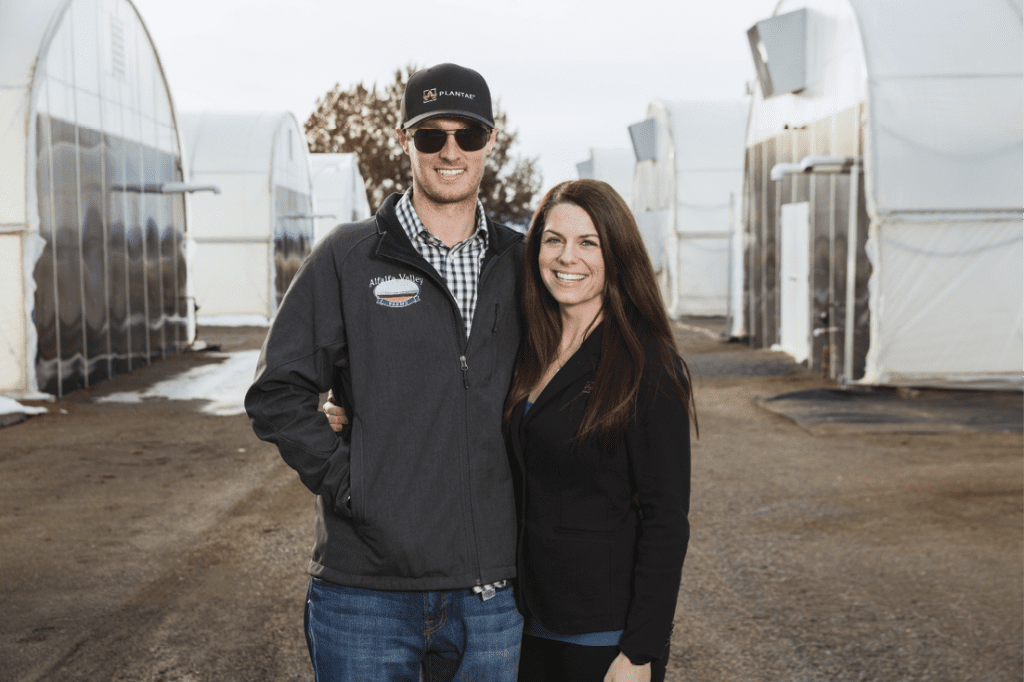
When Jocelyn Anderson quit her job as the principal of a K-8 charter school in Chico, she declined to mention that she was planning to open a farm-to-table cannabis business in Bend. When her husband, Andrew—a fifth generation farmer who had specialized in growing almonds, walnuts and rice—broke the news to his grandparents that he was shifting to cannabis, they weren’t exactly encouraging.
“Their generation lived through the reefer madness era—they were misinformed,” Andrew, 30, said. “But once we educated them, told them it was legal, they started to understand.”
Nearly two years after the Andersons took the plunge into the marijuana industry, by purchasing a forty-five-acre farm in Alfalfa, they no longer worry about what people think of their new vocation. Her colleagues are mostly supportive, his grandparents have come around, and most of their friends are impressed by and envious of their new career. Business is good—their Plantae Health dispensary opened in Prineville in July 2015, they expanded to Madras three months later and their third location, a new retail outlet on the east side of Bend, opened in January.
But they’ve also discovered that running a cannabis business presents a unique set of challenges. The couple, who met on a blind date at an Italian restaurant in 2010, said that the staggering startup costs, the ever-changing regulations and the local politics surrounding marijuana make producing cannabis a lot more complex than the traditional crops they used to grow in California.
With the end of the transitional recreational marijuana phase on December 31, consumers can now buy one ounce of cannabis—quadruple the previous daily limit of seven grams. The Andersons are optimistic that their investment and sweat equity will pay off in what could be a record-setting year for cannabis sales in Central Oregon.
On a blustery Saturday afternoon in January, Andrew, who handles the farming end of their partnership, looked the part as he inspected their new location prior to its grand opening. Dressed in a pair of work boots and overalls, with an oversized smartphone protruding from a breast pocket, Andrew also sounded a lot like any farmer who is passionate about his crop, and his right to grow and sell it.
As a former teacher and school principal, it’s come natural for Jocelyn to offer tours of their locations in order to educate locals and attempt to dispel misconceptions, such as the notion that one could get high inadvertently from living near someone’s cannabis greenhouse or that the plant’s roots contaminate the soil. Most people, she said, have been receptive to her message.
Nearly a year after they started these efforts, the Board of County Commissioners voted in August 2016 to repeal the “opt out” moratorium that prohibited marijuana-related businesses in rural Deschutes County. Andrew said that most of their neighbors in Alfalfa are farmers, so they’ve had fewer conflicts than growers in Tumalo, where cannabis farms are much closer to residential dwellings. He insists that the biggest problems facing the industry aren’t neighborly relations but rather over-regulation, licensing issues and the fact that banks won’t work with marijuana businesses.
Despite the obstacles, the Andersons think that the cannabis industry is slowly but surely gaining respect and acceptance in the region.
“Bend is built on breweries and cannabis,” said Andrew. “With our elevation, the water, the air quality, this is one of the best places in the country to grow [cannabis]. And it helps drive our economy.”
Jocelyn, 29, is thrilled to be part of a movement of young cannabis entrepreneurs striving to change how the public perceives the drug.
“We’re changing the image of this industry—turning it into something people perceive as legitimate and professional,” she said.
The connector
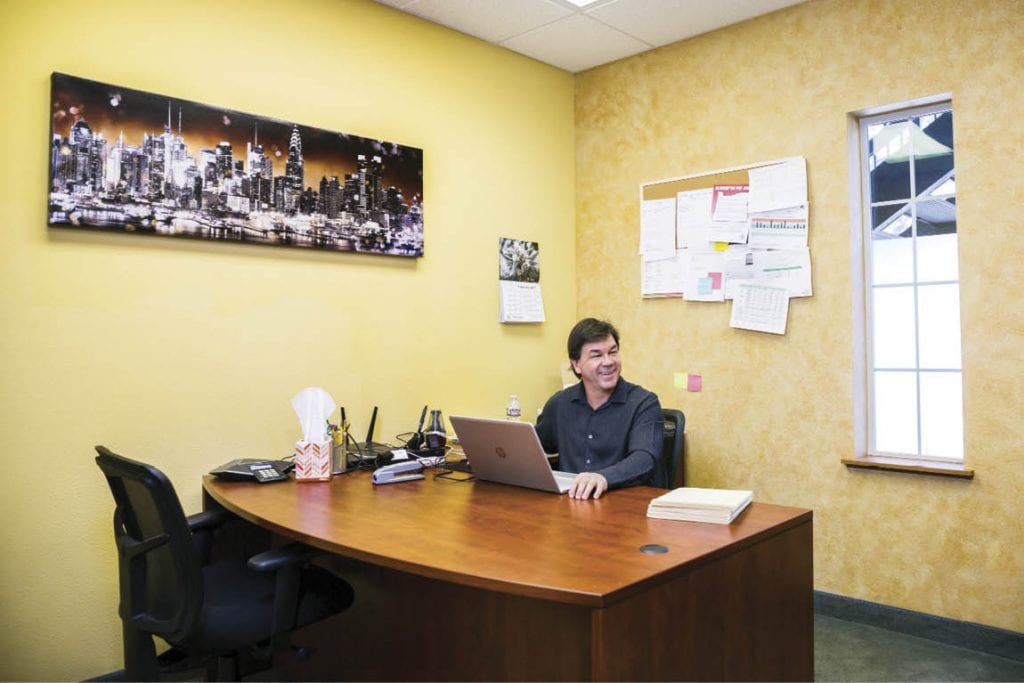
Kelly Martin is one of Central Oregon’s most innovative marijuana entrepreneurs, but you wouldn’t know it from walking into the office building he shares with four attorneys in southwest Bend. There are no Bob Marley or Grateful Dead tunes piped in from the ceiling, no patchouli incense wafting through the air and no dreadlocked interns preparing spliffs. Martin has a firm handshake and the build of a wrestling coach. On a wintry Friday morning in December, he was clean-shaven and his medium-length brown hair was neatly parted on the side.
“The stereotype of people in this industry being hippies is grounded in reality, but there are clean-cut types like me, too,” he said. “It’s becoming a business just like other businesses.”
Martin, a self-described “serial entrepreneur,” has a strong basis for comparison. Before founding Dakine 420, a Redmond-based marijuana fertilizer company, in 2013 and a website about all things cannabis called CannaFo in 2015, the Portland native tried his hand at a host of business ventures. He was a builder; he owned a landscaping company and a sporting goods store; he bought and sold cars; and for fourteen Christmas seasons he sold some of Central Oregon’s most beautiful trees to Hawaiians on the Big Island.
“Some trees fetched as much as $150,” he recalled. “I was like the Neiman Marcus of Christmas tree sellers.”
Martin also grew marijuana before it was legal and lost three years of his life behind bars as a consequence. Unlike his other business ventures, CannaFo is more personal. The website aims to connect people in a stigmatized industry, where sharing information and ideas in a transparent forum has been more of an exception than the norm.
“I want to be the Google of the cannabis industry, a resource, kind of like an encyclopedia,” he said.
Martin launched CannaFo in late 2015. It has 165,000 Facebook followers. The site’s CannaFo Connect feature is essentially a trade platform that allows producers, processors and retailers to connect. Producers can share photos, lab results and other data about their products, dispensaries can post their menus, and consumers can rate strains and retailers.
Subscriptions are free for at least ninety days, and the site now has more than 4,000 dispensaries listed. CannaFo is also a sort of clearinghouse of information, where consumers and industry experts alike can learn about different strains, growing techniques, industry news and more.
Clearly there’s money to be made in the industry—researchers have estimated that legal, domestic sales of marijuana in 2016 may have reached $7 billion—but Martin says the so-called “Green Rush” isn’t what motivates him. In prison, he lived among plenty of other non-violent marijuana offenders, and he’s passionate about changing the nation’s drug laws and the public perception of cannabis.
Even as an outspoken advocate for the decriminalization of pot, Martin recognizes that legalization has also taken a little of the cloak and dagger, countercultural appeal away from buying marijuana.
“I think some people do miss the old days,” he said, a smile creeping across his face. “How cool and rebellious is it to simply walk down to the store and buy your pot?”

